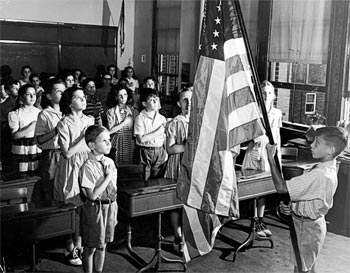It's Illegal to Force Students to Recite the Pledge of Allegiance
Posted Feb. 8, 2015 09:59 am
The Supreme Court ruled in 1943 that students didn’t have to say the Pledge of Allegiance if they brought in a signed letter from their parents.
Not everyone is aware of the law and misguided teachers still occasionally force students to stand and say the Pledge. Enter the ACLU and a few non-conformists. Recently, some schools decided to post a disclaimer in classrooms, informing students (and teachers) that they had the right not to stand.
 In
Panhandle schools, these signs are in every room, under
every flag.
In
Panhandle schools, these signs are in every room, under
every flag.
This bums some people out. Red, white and blue types. Military types.
In other parts of the state, disclaimers are nowhere to be found. I taught for eight years at three public high schools and one middle school. I never saw any disclaimers on any walls. I never heard of students bringing in notes from their parent to get out of saying the pledge.
My kids and their friends have never seen any notices in their schools either. In Florida, maybe disclaimers are like T-shirts on grown men — whether you see them depends on the county.
A bill with bipartisan support is making its way through the Legislature that will move these notices from classroom walls to student handbooks.
More bad news: student handbooks are in a three-way tie with nutrition labels and STOP signs for least-read among teenagers.
But far be it from me to criticize something that unites Democrats and Republicans in Florida. That hasn’t happened here since pig roasts became legal.
I can’t figure out if this bill is designed to placate military types in the northwestern part of the state who are sick of looking at disclaimers while trying to get their patriotism on. Or perhaps it’s to get more students, especially as they enter middle and high school, to say the Pledge of Allegiance.
If taking them down helps military families feel more at ease, take them down. I don’t think anyone else is reading them anyway. I used to have READ MORE signs in my classroom and no one noticed when someone defaced them to say WEED MORE.
Including me.
I’m not sure putting the notice in student handbooks will encourage students to recite the Pledge. Teenagers are already forced to do a ton of activities they don’t want to do. They study, eat right, study, join Fellowship of Christian Athletes, study, obey curfew, turn off video games, do chores, study, complete their volunteer hours, chew with their mouths closed, stop with the 25-minute showers and study some more.
They’re saturated. Overloaded with “musts” and “vitals” and about a million “requireds.” And so they’re done.
Getting them to stand for the Pledge is possible, but school officials will have to think outside the box.
When I was a teacher, I turned on the television and played the school’s morning show. I didn’t make them say the Pledge. Most did not.
This annoyed some of my colleagues. So did my online profile picture where I wore a robe and drank a glass of wine, but that’s a different story. Fellow teachers would loudly disapprove, with frowns and weird noises. My take was this: forcing students to say the Pledge goes against what the Pledge is about.
Plus it’s illegal.
Plus I don’t even recite the Pledge; how can I force others to?
Whenever I’m anywhere and there’s a call to stand for the Pledge, I stand and then I look around. I wonder how many people repeat the words from memory without giving them any thought. I wonder if they know the part about God was added in the 1950s as a statement against communism. I wonder if they say “Liberty and justice for all” with any sense of irony.
I do the same thing at church.
Group chanting, especially compulsory group chanting, is strange. People seem to do it out of duty, rather than interest. Like taxes. Or marriage.
Reciters don’t look alive. They seem transfixed. Like when I watch Chris Cornell from Soundgarden, but without the sexual tension. I preferred to engage my homeroom students in discussions about current events or pop culture and sneak in subliminal life lessons.
This helped nurture critical thinking and they seemed to enjoy our talks. Several times we discussed ways to show love of country and ideals this nation was built upon, rather than stand and repeat words that didn’t mean anything to them.
Other times, students would voluntarily stand and say the Pledge on their own. My two sons, for example, did that every day last year. They were the only students in their 9th grade homeroom who said the Pledge and when I asked why, they both said they didn’t know.
They didn’t know why they stood when everyone else ignored it.
Teenagers are bizarre. They don’t know why they do lots of things.
I’m just glad they didn’t do it because they felt they had to.
Catherine Durkin Robinson co-parents twin sons, organizes families for political purposes, writes syndicated columns, mentors kids, runs a few races and investigates missing socks. Follow her on Twitter: @cdurkinrobinson. Column courtesy of Context Florida.
Image added by the Observer
This piece was reprinted by the Columbia County Observer with permission or license.

 By
Catherine Durkin Robinson
By
Catherine Durkin Robinson